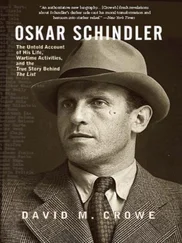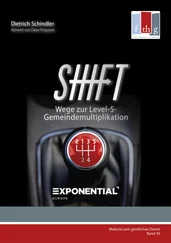When the last tank had vanished, the men of the commandos could hear mourning from the courtyard and from the women’s dormitory upstairs. A girl had been wounded by shell fragments. She herself was in shock, but the sight of her injuries had released in the women all the barely expressed grief of the past years. While the women mourned, the Brinnlitz doctors examined the girl and found that her wounds were superficial.
Oskar’s party traveled for the first hours of their escape at the tail of a column of Wehrmacht trucks. At midnight feats of this nature had become feasible, and no one pestered them. Behind them they could hear German engineers dynamiting installations, and occasionally there was the clamor of a distant ambush arranged by the Czech underground. Near the town of Havlíčkův Brod they must have fallen behind, because they were stopped by Czech partisans who stood in the middle of the road. Oskar went on impersonating a prisoner. “These good people and I are escapees from a labor camp. The SS fled, and the Herr Direktor. This is the Herr Direktor’s automobile.”
The Czechs asked them if they had weapons. Reubinski had come from the truck and joined the discussion. He confessed that he had a rifle. All right, said the Czechs, you’d better give us what you have. If the Russians intercepted you and found that you had weapons, they might not understand why. Your defense is your prison uniforms.
In this town, southeast of Prague and on the road to Austria, there was still the likelihood of meeting disgruntled units. The partisans directed Oskar and the others to the Czech Red Cross office in the town square. There they could safely bunk down for the rest of the night. But when they reached town, the Red Cross officials suggested to them that given the uncertainty of the peace, they would probably be safest in the town jail. The vehicles were left in the square, in sight of the Red Cross office, and Oskar, Emilie, and their eight companions carried their few pieces of baggage and slept in the unlocked cells of the police station.
When they returned to the square in the morning, they found that both vehicles had been stripped.
All the upholstery had been torn from the Mercedes, the diamonds were gone, the tires had been taken from the truck, and the engines had been plundered. The Czechs were philosophical about it. We all have to expect to lose something in times like these. Perhaps they may even have suspected Oskar, with his fair complexion and his blue eyes, of being a fugitive SS man.
The party were without their own transport, but a train ran south in the direction of Kaplice, and they caught it, dressed still in their stripes. Reubinski says that they took the train “as far as the forest, and then walked.” Somewhere in that forested border region, well to the north of Linz, they could expect to encounter the Americans. They were hiking down a wooded road when they met two young gum-chewing Americans sitting by a machine gun. One of Oskar’s prisoners began to speak with them in English. “Our orders are not to let anyone pass on this road,” one of them said.
“Is it forbidden to circle around through the woods?” asked the prisoner.
The GI chewed. This strange chewing race!
“Guess not,” said the GI at last.
So they swung through the woods and, back on the road half an hour later, ran into an infantry company marching north in double column. Through the English speaker once more, they began to talk to the unit’s reconnaissance men. The commanding officer himself drew up in a jeep, dismounted, interrogated them. They were frank with him, telling him that Oskar was the Herr Direktor, that they were Jews. They believed they were on safe ground, for they knew from the BBC that the U.S. forces included many Americans of both German and Jewish origins. “Don’t move,” said the captain. He drove away without explanation, leaving them in the half-embarrassed command of the young infantrymen, who offered them cigarettes, the Virginia kind, which had that almost glossy look—like the jeep, the uniforms, the equipment—of coming from a grand, brash, unfettered, and un-ersatz manufactory.
Though Emilie and the prisoners were uneasy that Oskar might be arrested, he himself sat on the grass apparently unconcerned and breathed in the spring air in these high woods. He had his Hebrew letter, and New York, he knew, was ethnically a city where Hebrew was not unknown. Half an hour passed and some soldiers appeared, coming down the road in an informal bunch, not strung out in the infantry manner.
They were a group of Jewish infantrymen and included a field rabbi. They were very effusive. They embraced all the party, Emilie and Oskar as well. For these, the party was told, were the first concentration-camp survivors the battalion had met.
When the greetings were over, Oskar brought out his Hebrew reference, and the rabbi read it and began to weep. He relayed the details to the other Americans. There was more applause, more hand shaking, more embraces. The young GI’S seemed so open, so loud, so childlike. Though one or two generations out of Central Europe, they had been so marked by America that the Schindlers and the prisoners looked at them with as much amazement as was returned.
The result was that the Schindler party spent two days on the Austrian frontier as guests of the regimental commander and the rabbi. They drank excellent coffee, such as the authentic prisoners in the group had not tasted since before the founding of the ghetto. They ate opulently. After two days, the rabbi presented them with a captured ambulance, in which they drove to the ruined city of Linz in Upper Austria.
On the second day of peace in Brinnlitz, the Russians still had not appeared. The commando group worried about the necessity of hanging on to the camp for longer than they had thought they’d have to. One thing they remembered was that the only time they’d seen the SS show fear—apart from the anxiety of Motzek and his colleagues in the past few days—had been when typhus broke out.
So they hung typhus signs all over the wire.
Three Czech partisans turned up at the gate in the afternoon and talked through the fence to the men on sentry duty. It’s all over now, they said.
You’re free to walk out whenever you want. When the Russians arrive, said the prison commandos. Until then we’re keeping everyone in. Their answer exhibited some of the pathology of the prisoner, the suspicion you got after a time that the world outside the fence was perilous and had to be reentered in stages. It also showed their wisdom. They were not convinced yet that the last German unit had gone.
The Czechs shrugged and went away.
That night, when Poldek Pfefferberg was part of the guard at the main gate, motorcycle engines were heard on the road. They did not pass by, as the Panzers had done, but could be heard turning in toward the camp itself. Five cycles marked with the SS death’s-head materialized out of the dark and drew up noisily by the front fence. As the SS men—very young, Poldek remembers— switched off their engines, dismounted, and approached the gate, a debate raged among the armed men inside as to whether the visitors ought to be immediately shot.
The NCO in charge of the motorcycle party seemed to understand the risk inherent in the situation. He stood a little way from the wire with his hands extended. They needed gasoline, he said. He presumed that being a factory camp, Brinnlitz would have gasoline.
Pfefferberg advised that it was better to supply them and send them packing than to create problems by opening fire on them. Other elements of their regiment might be in the region, and be drawn by an outburst of gunfire.
So in the end the SS men were let in through the gate, and some of the prisoners went to the garage and drew gasoline. The SS NCO was careful to convey to the camp commandos—who had put on blue coveralls in an attempt to look like informal guards, or at least like German Kapos—that he did not find anything peculiar in the idea of armed prisoners’ defending their camps from within. “I hope you realize there’s typhus here,” said Pfefferberg in German, pointing to the signs. The SS men looked at each other.
Читать дальше












